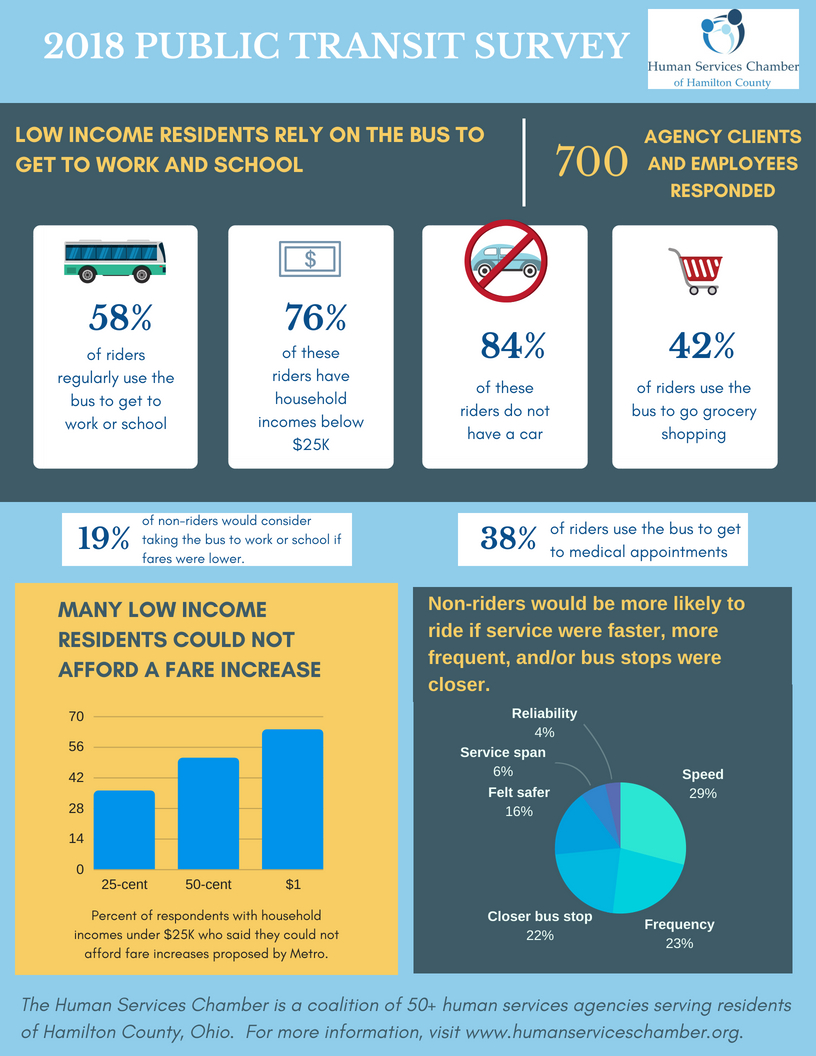Many residents in Hamilton County rely on Cincinnati Metro to get to their jobs, medical appointments, and to the grocery store. Unfortunately, Cincinnati Metro is facing multimillion dollar budget deficits beginning in 2019, and will likely be forced to reduce service if a new source of funding is not found. As these critical funding issues move forward, HSC will continue to advocate for a robust public transit system that meets the transportation needs of lower income riders, that keeps rates affordable, and that meets the needs of persons with disabilities. HSC will also focus on identifying and promoting alternatives to public transit for lower income individuals and families, such as bike-sharing and car ownership programs.
TRANSPORTATION & PUBLIC TRANSIT
2018 PUBLIC TRANSIT SURVEY
The Human Services Chamber recently conducted a survey of the clients and staff of our member agencies. What we learned from over 700 responses is that 76% of the bus riders are from households with incomes below $25K and 58% of them regularly use the bus to get to work or school. Additionally, 84% of these riders do not have access to a car, so the bus is likely their only option to get to work. When asked what improvements would make a 25-cent increase worth it to them, over 30% of respondents with incomes under $25K said they could not afford a 25-cent increase.

TRANSPORTATION EMPOWERMENT FUND
In response to these findings, HSC has asked Metro to establish a Transportation Empowerment Fund to help low income riders afford bus fares. This initiative would provide free or discounted bus passes or other types of ride options to eligible low-income citizens through participating non-profit or government organizations. Participating organizations would purchase these passes at a 50% discount, then distribute them to eligible riders. The Fund would be managed by a broad panel of stakeholders, including bus riders and representatives of SORTA, the business community, and the human services sector. This partnership between Cincinnati Metro and human services agencies would allow both to focus on what they do best- Metro can focus on operating the public transit system and human services agencies can help the people they serve.
Cincinnati Metro has agreed to fund the Transportation Empowerment Fund in the amount of $500K per year if the proposed public transit levy is passed by voters. This funding would connect a significant number of workers to jobs, medical appointments and the grocery store.
PARATRANSIT SERVICE IMPROVEMENTS
HSC has asked Cincinnati Metro to make specific commitments to improving Access service for seniors and people with disabilities who are unable to use regular bus service. Increased demand with stagnant funding has led to overcrowded buses as well as long rides and wait times for those who rely on Access for transportation. If passed, the public transit levy on the ballot this March will provide additional funding from will allow SORTA to address many of these issues.
Our requests to Metro:
- Commit to increasing the operating budget of Access by the same percentage that the operating budget for regular bus service is increased (at a minimum).
- Make the following improvements to Access service, as funding permits:
- Expand Access service to all of Hamilton County;
- Provide automated notice to riders 10-15 minutes prior to arrival time through text or phone call;
- Increase on-time performance;
- Reduce ride times so that rides last no longer than a ride to the same destination using regular bus service;
- Provide door-to-door service upon request;
- Ensure that Access and regular bus service meet ADA standards;
- Provide quarterly progress or status reports on each of the above items.




